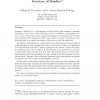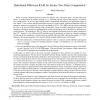252 search results - page 44 / 51 » How Secure is Deterministic Encryption |
138
click to vote
TCS
2002
15 years 1 months ago
2002
Suppose a principal in a cryptographic protocol creates and transmits a message containing a new value v, later receiving v back in a different cryptographic context. It can concl...
161
click to vote
PODC
2003
ACM
15 years 7 months ago
2003
ACM
Traitor Tracing Schemes constitute a very useful tool against piracy in the context of digital content broadcast. In such multi-recipient encryption schemes, each decryption key is...
223
Voted
ASPLOS
2009
ACM
16 years 2 months ago
2009
ACM
For many mission-critical tasks, tight guarantees on the flow of information are desirable, for example, when handling important cryptographic keys or sensitive financial data. We...
135
click to vote
IJISEC
2010
14 years 11 months ago
2010
We propose a generalization of Paillier's probabilistic public key system, in which the expansion factor is reduced and which allows to adjust the block length of the scheme e...
131
Voted
IACR
2011
14 years 1 months ago
2011
Secure two-party computation protocol allows two players, Alice with secret input x and Bob with secret input y, to jointly execute an arbitrary program π(x, y) such that only th...


